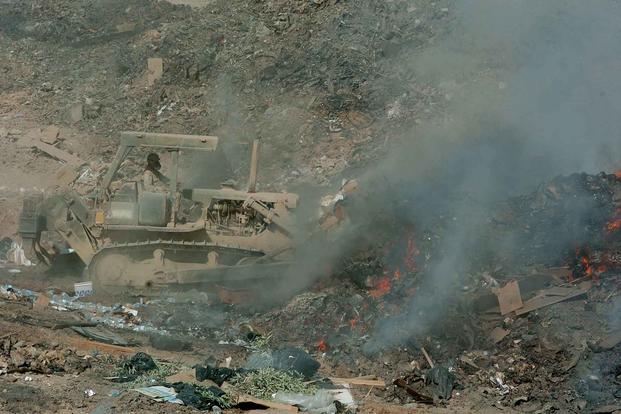Landmark legislation to expedite health care and disability coverage for millions of veterans who were exposed to toxic chemicals during their military service was approved by the House on Thursday.
The House voted 256-174 to pass what's being called the Honoring Our PACT Act, a $208 billion measure that would pave the way for Department of Veterans Affairs benefits for vets suffering from nearly two dozen illnesses suspected to be linked to battlefield pollutants. Thirty-four Republicans voted with Democrats in support of the bill.
Lawmakers and advocates are celebrating the vote as a major win in a years-long fight for official recognition that their ailments were caused by breathing in fumes from burn pits and other toxins. But they also acknowledge the fight is not over, with the battleground now moving to the Senate, which has opted for a narrower approach amid Republican concerns about the price tag of the House bill.
Read Next: Ukraine's Fighter Ace 'Ghost of Kyiv' May Be a Myth, But It's Lethal as War Morale
"If we are to support the cost of starting and sustaining war, we must acknowledge the financial cost of supporting those veterans it creates," House Veterans Affairs Committee Chairman Mark Takano, D-Calif., said at a news conference Wednesday to rally support ahead of Thursday's vote. "We cannot renege on our responsibility because of sticker shock."
The bill approved Thursday has been heralded by supporters as a comprehensive approach to helping the 3.5 million veterans estimated to have been exposed to burn pits and other airborne hazards while serving.
Right now, the VA makes case-by-case decisions on most claims by post-9/11 veterans that their illnesses were caused by toxic exposure, requiring vets to produce proof their disease is connected with their service. Asthma, rhinitis and sinusitis are exceptions after the VA last year said it would automatically presume those illnesses were caused by burn pits.
On Tuesday, ahead of President Joe Biden's State of the Union address, the VA announced it will also soon expand the list of presumptive illnesses to 10 cancers.
"I've always believed that we have a sacred obligation to equip all those we send to war and care for them and their families when they come home," Biden said in the speech.
"I'm also calling on Congress to pass a law to make sure veterans devastated by toxic exposure in Iraq and Afghanistan finally get the benefits and the comprehensive health care they deserve," added Biden, who believes his son Beau's fatal brain cancer may have been caused by burn pits in Iraq and Kosovo.
The Honoring Our PACT Act would designate 23 diseases as presumed to be linked to burn pits and other airborne hazards. In addition to post-9/11 veterans, the bill also would extend coverage to Vietnam veterans suffering hypertension; Vietnam-era veterans exposed to Agent Orange while serving in Thailand, Cambodia and Laos; and veterans exposed to radiation during nuclear waste cleanup.
The Congressional Budget Office estimated this week the bill would cost $208 billion over the next 10 years, down from an earlier estimate of $282 billion after some tweaks to the legislation before it was brought to the House floor that did not diminish plans for increased medical coverage.
Most Republicans have bristled at the price tag even as they say they support improving care for toxic-exposed veterans.
"Anyone who has served or has a loved one who serves, like I have and do, knows what war costs," Rep. Mariannette Miller-Meeks, R-Iowa, said on the House floor. "They also know that veterans pay taxes too. They also know that veterans have children and grandchildren whose futures they don't want to be any more burdened with debt than they already are."
An amendment offered Wednesday by House Republicans to replace the Honoring Our PACT Act with the text of a narrower Senate bill failed 203-233, largely along partisan lines.
In response to critics of the price, the Senate has decided to tackle the issue of toxic exposure in a three-pronged approach.
The first prong was easily approved by the Senate last month. The Senate bill, negotiated by Senate Veterans Affairs Committee Chairman Jon Tester, D-Mont., and committee ranking member Jerry Moran, R-Kan., would create a one-year enrollment period for VA medical care for post-9/11 combat veterans who served after 1998 and never enrolled. It would also extend the enrollment period for all formerly deployed post-9/11 combat vets from five years to 10.
Supporters of the Senate bill say it could extend health coverage to at least 1 million veterans exposed to burn pits and other types of pollution. The measure's estimated cost is $1 billion.
Tester and Moran envision the next two steps entailing the creation of a new process for the VA to determine future presumptive conditions and providing overdue benefits to ill veterans.
The Senate bill has garnered endorsements from some major veterans groups, but other veterans advocates have panned the piecemeal approach.
At Wednesday's news conference, activist John Feal called on Takano and House Speaker Nancy Pelosi, D-Calif., to push Senate Majority Leader Charles Schumer, D-N.Y., for a vote on the Honoring Our PACT Act.
"If he does not do that, then I will make his life miserable," Feal said of Schumer.
Comedian-turned-veterans-advocate Jon Stewart also had a message for those seeking to water down the House bill: "F--- that. Not happening."
Takano told reporters Wednesday he had not yet spoken with his Senate counterpart, Tester, about next steps, but he's "looking forward to the meeting with John Feal."
Pelosi, while diplomatically avoiding Stewart's profanity, said she would "associate herself" with Feal and Stewart's remarks and that the House would "reject" a watered-down bill.
"If we're not willing to pay the price of war," Pelosi said, "then we shouldn't go."
-- Rebecca Kheel can be reached at rebecca.kheel@military.com. Follow her on Twitter @reporterkheel.












